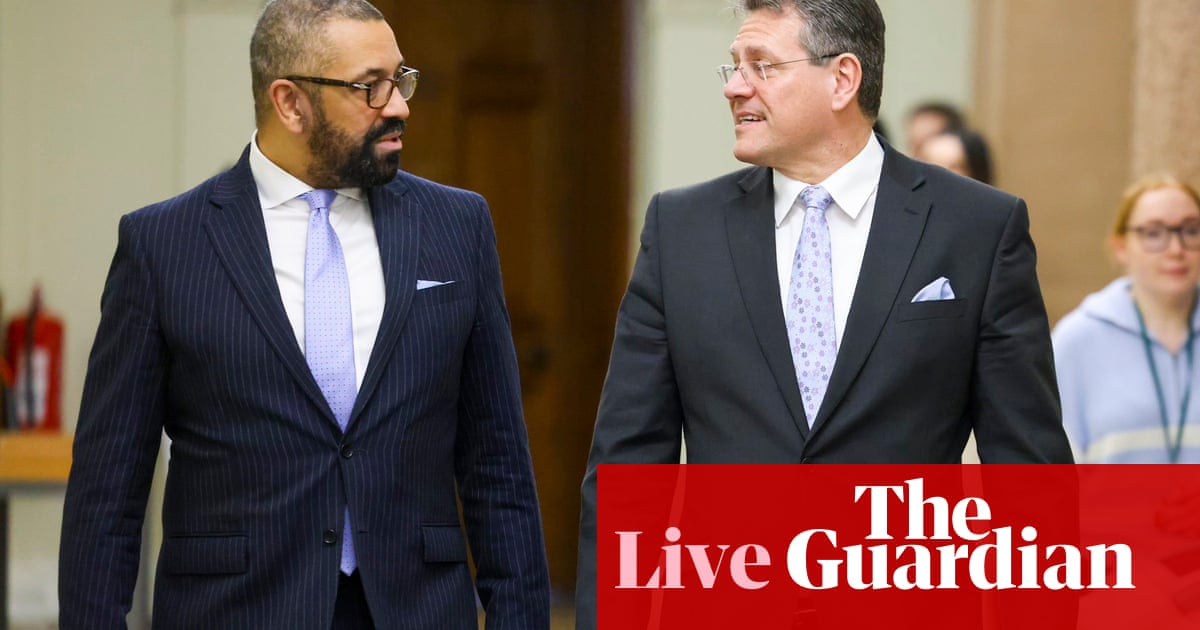
An uneasy Christmas truce has been called over the post-Brexit arrangements for Northern Ireland, even as the EU said it would not negotiate over a key British demand in the rancorous talks.
Maroš Šefčovič, the EU Brexit commissioner, said there was “momentum” behind discussions after a major British U-turn, but refused to offer quid pro quo concessions.
Downing Street has conceded in recent weeks that it will prioritise removing barriers to trade between Great Britain and Northern Ireland over other constitutional issues that have bedevilled the talks. Talks will be suspended until after Christmas.
But in a blow to the British government, the commissioner on Friday refused even to engage with its demand for any renegotiation over the role of the European court of justice (ECJ) in the enforcement of EU law in Northern Ireland, despite a UK concession that the court could retain a role in the protocol.
“It was not disputed at all until the summer of this year and therefore the topic we are not ready to include in our discussions,” said Šefčovič, the EU commissioner in charge of UK relations.
Under a protocol of the withdrawal agreement, Northern Ireland in effect remains within the EU’s single market and the bloc’s customs border is drawn down the Irish sea. The EU court is the final arbiter of disputes.
The British government, however, wants an independent arbitration system rather than giving the ECJ the last say, although in recent days it has accepted the court in Luxembourg will resolve questions about EU law if issues come to arbitration.
A potential solution exists in the post-Brexit trade agreement and the EU’s deal with Switzerland. But the European Commission said on Friday that this model was not feasible – yet.
A senior EU official said the protocol was “completely different” to the EU trade agreement with Switzerland, because the Northern Ireland agreement was based on “the direct application of reams of EU legislation”, rather than “elements of EU law, which are referred to or paraphrased” as in the deal with Berne. “It was judged that this arbitral solution was not sufficient, and that you needed the full powers of the court of justice,” the official said.
Another barrier is that the commission refuses to reopen an agreement that was signed by Boris Johnson little more than two years ago.
There is agreement to extend a standstill arrangement beyond 1 January to avoid the full implementation of customs on meat and agricultural imports.
But Brussels remains mistrustful of the British government. “The fundamental stumbling block is that we need the UK to move back into a logic of the implementation of an agreement that it negotiated, signed and ratified,” said a senior official.
The two sides are also at odds over the process of the talks. While British officials have spoken of “a staged approach”, where issues are agreed one by one, the EU would like a single agreement.
Customs and health checks remain a major stumbling block in the talks. While the EU considers it has made a generous offer to cut red tape, the UK argues that its claims to remove 50% of customs checks and 80% of health checks do not stand up.
The EU announced on Friday it would rewrite its rules on medicines to ensure life-saving treatments and everyday drugs remained available in Northern Ireland, after threats to supply emerged. Without a change to the rules or grace period, medicine manufacturers based in Great Britain had warned they could cease supplying products to Northern Ireland, because of the extra costs imposed by red tape.
Hundreds of medicines used by the NHS in Northern Ireland were at risk. The commission has now proposed that new medicines for Northern Ireland can be authorised by the UK, even if they have yet to be approved by the EU regulator.
Under the proposals, quality control checks, so called “batch testing”, would not need to be repeated in Northern Ireland, if they had already been carried out in Great Britain or the EU. The proposals have to be agreed by EU lawmakers and ministers before coming into force.
Meanwhile, the French EU minister Clément Beaune said Paris would “in the coming days” begin proceedings against the UK over fishing licences it said Britain still owed a small number of French boats to allow them to operate in British waters.
“The next step will be to ask the commission in the coming days to convene the partnership council, as provided for under the Brexit trade deal to settle a problem,” Beaune said, adding that the procedure would target “the most urgent” cases.












